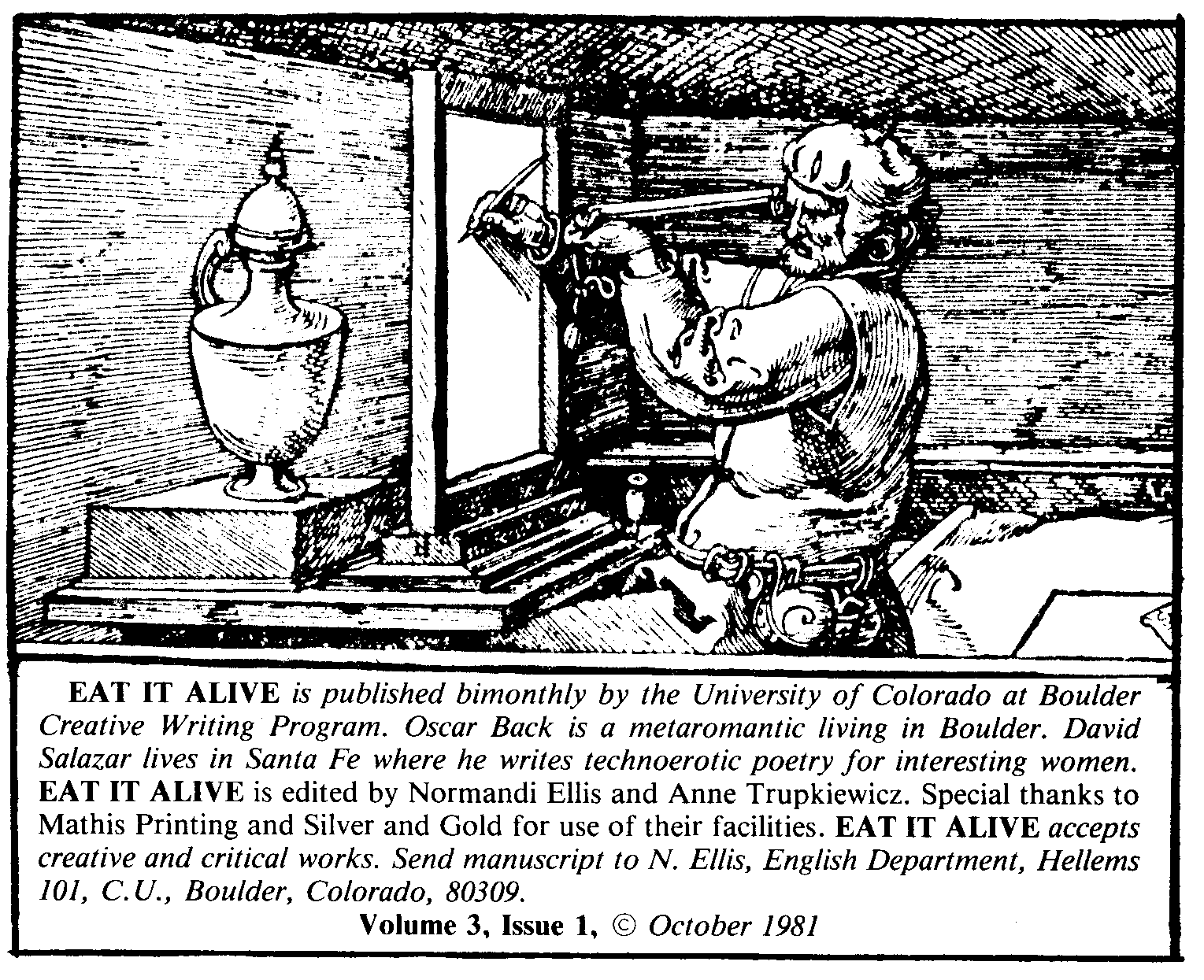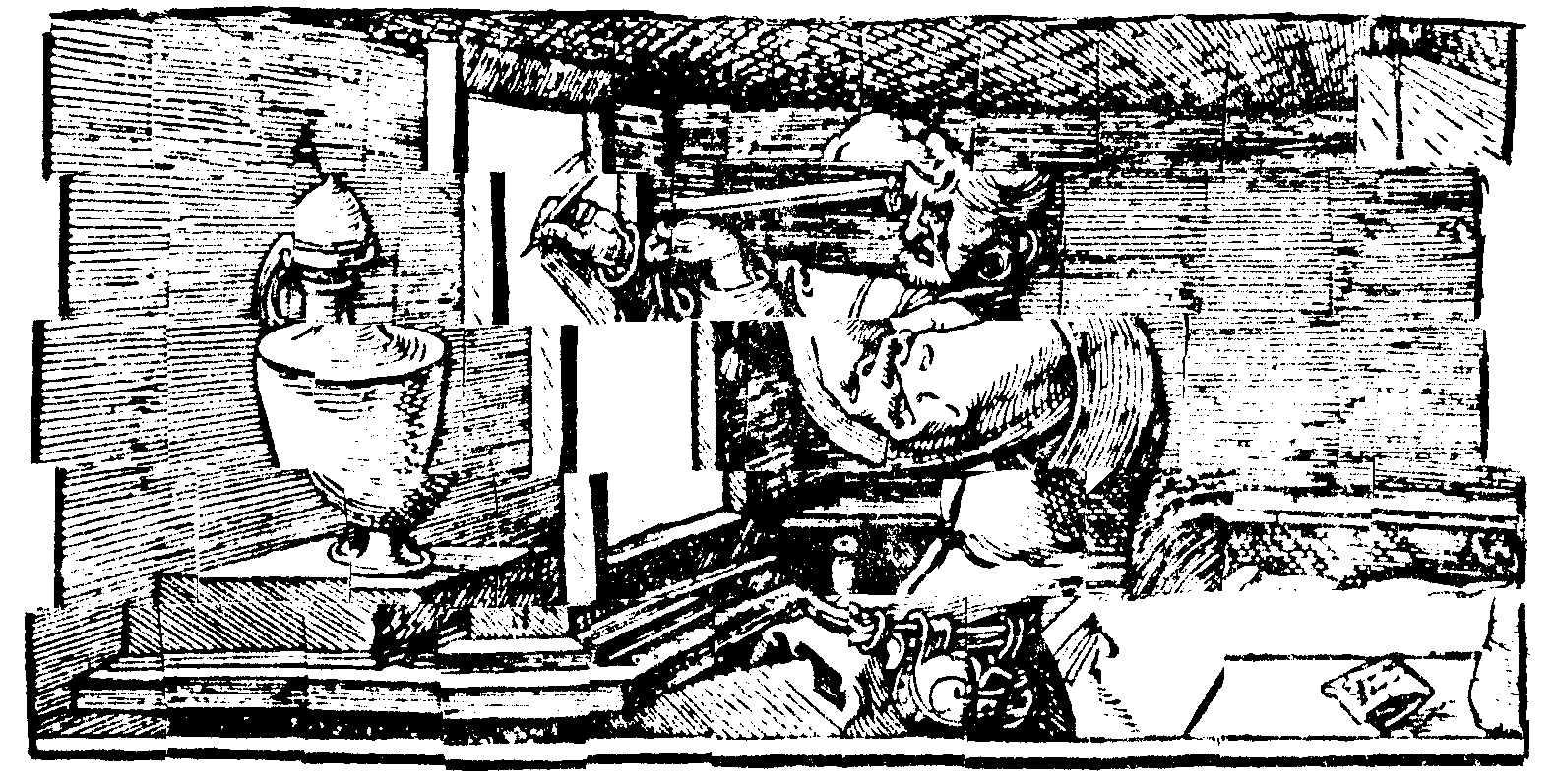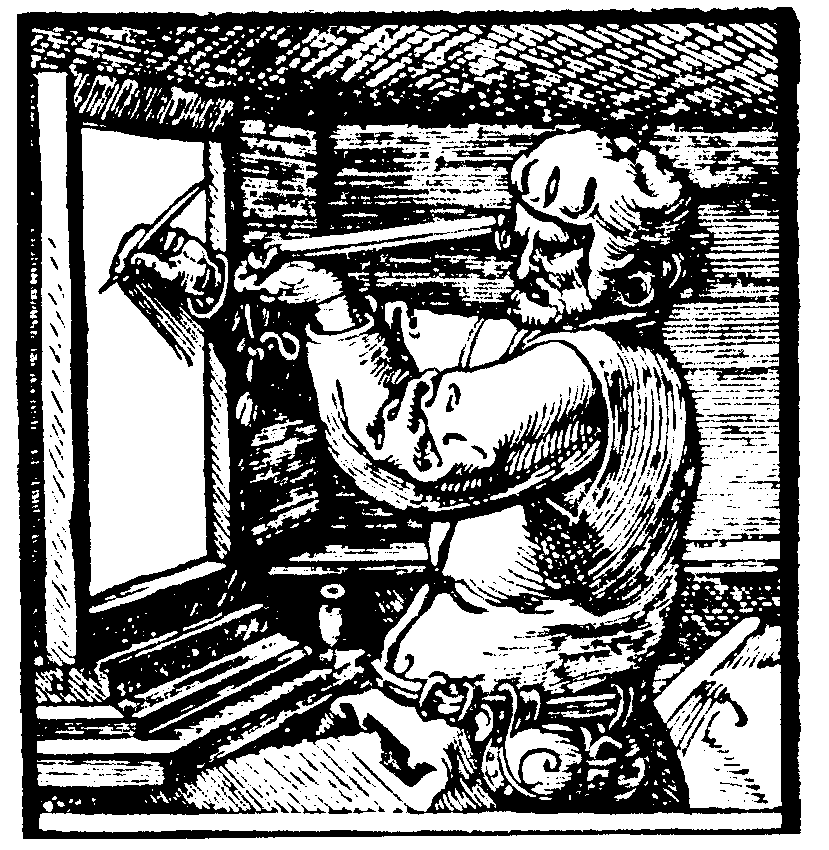

The Best Minds of My G-g-g-g-generation:
An Evening with Gregory Corso and Allen Ginsberg
I guess in the Sixties they called them happenings. As it happened, a friend of mine, Charlie Ross, managed to get the Blue Note to open its doors on a Sunday night, July 12, 1981. The scheduled event was a reading by Gregory Corso, with Allen Ginsberg and the Shambala Glass Chicken Rock and Roll Band. What did happen was the result of the fashionably tardy half-hour delay, a crowd left to warp in the rain, and several poets in search of an audience.
Charlie met my friend Tom and I at 6:30 P.M. so we'd have time to set things up before 8:00, when the doors were scheduled to open. Advance tickets had been selling for $2 apiece, and by the time of the show about a hundred were sold according to a last minute phone tally. In the alley behind the club we pounded on the steel door. Tom, a Michigander versed in cloud augury declared, "Looks like rain." The manager, dressed in contractual black and white, opened the door and apologized to us for not having the lights on. The switch was thrown and the manager enlightened Charlie as to how the club would handle the gate, absolutely no one under 21 would be admitted, refunds for advance holders would be given out of the till, don't wreck anything. Charlie, nodding like a foreigner being given directions to Bisbee, Arizona, assented with a final, "Okay. Whatever you say." He then appointed me Technical Advisor in Charge of Crowd Placement. "You're the boss," I said as I took the chairs down from the table tops.
"Not quite, big fella," admonished the manager. "I'm the boss."
It was then that I got a sick feeling, like when you're 200 miles from where you're going and you smell a burning wheel bearing. I found out later that the whole thing had been railroaded through under the auspices of the Boulder Poetry Project, and behind the back of the Boulder Council on the Performing Arts. Charlie had only to take his eye off things for five minutes before the hot-box really started smoking.
Allen Ginsberg was setting up with his band. A reliable source had it that he'd been to a Clash concert and read a few of his poems while they accompanied. He was even invited to tape a session with them for their next album. No doubt Allen had his heart set on being a rock star. We might have seen a new Allen, wearing wraparound punk shades, spitting on the Mall. But somehow the session with the Clash never came off. Allen returned to Boulder from New York with a new dream, and tonight would be his shot at making it a reality. But when I watched him trying to tune the band to his harmonium, I could only wish him luck.
Allen and the band were rehearsing a waltz, some c & w, reggae, all at the same time. The guitar and bass players were taking five and stretching it into fifteen. Ginsberg exhorted them to come up and play along "if they wanted to." While Hindemith was no doubt rolling over in his grave, I was biting a hole in my lower lip, dreading the possibility of Allen asking us, "How do we sound?" The doors were to open in fifteen minutes, and there was still equipment all over the dance floor. The roadie was moving at a Tai-Chi pace. Charlie lit the filter of a trembling cigarette and announced, "I think I can get away long enough to have a beer."
When Tom, Charlie, and I opened the door, we were confronted by a crowd of a hundred or so who were getting restless under the now steady drizzle. "When are the doors gonna open?" "What's going on in there?" Charlie made like Banisadir for the darkness of the nearest bar. No sooner had the waitress set three beers and a basket of fries before us when a runner from the Blue Note burst upon the scene and grabbed Charlie's arm.
"Gregory's here!" he gasped. "And the manager wants to 86 him!"
Charlie sucked down his beer and stuffed his pockets full of fries as he hadn't eaten that day. As we approached the Blue Note someone in the crowd shouted, "There he is!" We headed for the back door and pounded to save our lives. No sooner was he inside, than Charlie did what he could to cool things down. It was like trying to blow out a grease fire. No doubt the manager had been expecting Kahlil Gibran since Charlie's first mention of the word "poet." Corso was upset that the doors hadn't opened on time and imparted a "quick shot" on the nightclub management. "It's my club!" The manager stomped his feet. "Mine, mine, mine!"
"Why me?" Charlie rubbed his temples, "How do I get myself into these fine messes?"
Tom and I sat down and watched Ginsberg trying to figure out how to tune a soprano saxophone. The doors finally opened and the crowd began to pour in. There were a lot of problems with I.D. Some people had no picture I.D. A Japanese couple had a hard time convincing the management that a passport was valid I.D. The girls working the gate looked barely 21, to my amazement. And the management had gone so far as to supply this Evil-eye Fleagle type, who would remove his shades from time to time and stare holes into potential troublemakers.
Along with the usual gate hassles, many of the customers hadn't expected to be carded for a poetry reading as the tickets hadn't reflected an age restriction. It didn't seem to affect the turnout, though. The bar was soon open, the waitresses circulating, and the sound system was finally up. It was 8:30 when Charlie introduced the first act: "Allen Ginsberg and the Shambala Glass Chicken Band."
"That's 'Glass Chicken'," Allen corrected, then introduced the members of the band. He was interrupted by a Denver poet.
"Hey Allen, it's me, Ed. They won't let my three month old baby in the place."
Allen washed his hands in his water glass and pointed to our table. "Charlie Ross will take care of it. Charlie Ross, the man trying to hide under the table over there." Charlie got up to see what he could do. Ed was still ranting when Corso shouted to him to "wake up."
"You don't bring a baby into a bar." The daddy, from what I could gather, was like the bus terminal pest who drives you nuts with hundreds of snapshots of his rug-rat. Only this guy's m.o. was to force your attention onto the corpus delecti, as he'd done in a ritzy Denver restaurant where he proudly displayed baby's soiled diaper.
Charlie returned to our table looking stunned. "He socked me," Charlie mumbled. "I don't believe it."
Marylou, the woman behind the man, couldn't believe it. "Ed?" she asked.
"No. The baby. He hit me. Ed's last words to me, and Baby's first words were, 'Chuck you Farley, forever.'"
"Marylou," the man behind the eight ball continued, "if I manage to live through this, remind me never to do this again."
Allen then announced the first number, a Blake ditty to waltz time in the approximate key of C. "Stuff wax in your ears, but tie me to the mast," I said to Tom. "This I gotta hear!"
"A vun and a two and a tree!" A greying Charlie ordered up a round of Geritol for our table and took his place just off stage to supply soap bubbles through the entire number. The wax didn't help Tom any as there was a slick boy on the dance floor doing a close-captioned interpretive dance. Ginsberg and the boys in the band showed no mercy. Just when I thought I'd heard the worst, Allen cued the soprano sax player who launched into a dysphonic solo, the likes of which could have charmed any cobra into pulling the lid back onto his basket.
After "the Basho Hop" and a song called "Father Death," the musical instruments of torture were put up, and a familiar voice wailed out of the darkness, "What about atomic death?" It was Libby. A hyperactivist heckler and poet who'd been making her presence heard around the summer's reading circuit. She was momentarily silenced by the all too familiar rejoinder, "Can it, Libby!"
At last, Gregory Corso was introduced. In light of the altercation with the manager, I should mention that Corso's attitude to this reading engagement was indeed professorial. He'd mounted the stage as sober as a judge, where on other occasions he'd been known to teeter a bit, like a congressman. He sat down and adjusted his reading glasses.
Corso prefaced the first set by chastising the poet daddy with the minor baby, and then the manager, for calling his woman an asshole. Corso then took it into the first poem, Liability, a scathing poem in which the bartender is dubbed "a truncated tyrant" and "Hitler in his dive," while the poet awaits "his digital axe 86." The crowd went wild. The manager went scarlet and puffed up to twice his size, a 38 S. "Doesn't this place have air conditioning?" a woman asked me.
Corso was just into his fourth poem, How Not to Die, when Libby piped up as she would again and again. "When you gonna get to the atomic bomb?"
"I already handled it in the past," Corso snapped. "I wrote the bomb poem, babe, and it was no dud."
People continued to trickle in — some bounced out — and Corso read on, as only he can read. Libby continued to heckle and Corso made short work of her. When she demanded freedom of speech, he was all too glad to offer her a shot at the mike when his "freedom shot" was up. He concluded the set with Poetry and Drugs, and a poem to Libby about the "slow bullets of radiation."
Libby's shot was a rail shot. Her affected tent-revival tone of vehemence led me to believe that she'd been hitting the yang foods and red meats pretty hard. In her frantic attempts at "ban the bomb" poetry she did give credit to the beat generation, of which Ginsberg and Corso are illustrious members, for rallying antinuclear sentiment. The only other thing I got from her poems is that she's fond of hominy.
When Corso returned to conclude his reading he remarked about the heat. "Is the air conditioning on?" The second set saw a departure in tone from the first. Corso waxed reflexive, somber, as his poems dealt with the subjects of aging, death, and the spirit. The crowd was still as he read his last poem of the evening, Handing Down the Gauntlet of the Way. The poem saw "a dead body in a grave marked Gregory Corso" and cautioned, "And this is only a supposition for you may never see that grave. Surely, I'll never see it." He left the stage figuratively confirming the manager's literal fears. Gregory Corso brought the house down. As thunderous as was the applause, Corso did no encore. An encore would have been too much like some resurrection of the flesh. He sat back down with his companions, then turned to Charlie. "Anybody bring a joint?"
While Corso lit up, Allen Ginsberg lead the band in an anti-smoking song. The dance floor was packed with frantic, wigged-out, non-conformists just letting it happen. When the song began extolling the virtues of fellatio over tobacco, the manager turned the color of the Commie flag, and not at all like the Irishman he was, echoed the motto of the J.D.L.: "Never again!" As the music went from bad to worse, the club employees stared in amusement and bemusement at the people literally rolling on the dance floor.
"It's the new dance craze," I explained. "It's called the flop." When they took me at my word, I realized it was impossible to try to convince anyone that I was the only sane member in the audience. The waitress' expression was betraying me in her eyes as one of "them. You know. Naropa people." I tried to lighten things up. "How about this band? I hear the deal is $3 to get in and $4 to get out." She walked swiftly and calmly away as she looked over her shoulder to make sure I wasn't following her.

The manager, in the meantime, had taken Charlie aside and told him how the bar had lost money. Then he cautioned Charlie what it would cost the Blue Note if these "Naropa people" decided to pull a Jonestown, or something equally bizarre and uncalled for. Four new-wavers that had wandered into the scene remarked how "stupid" the band was. "Wow! Real stupid!" I have to admit, as the ridiculous often bottoms out into the sublime, the band was a hit, below the belt perhaps, but definitely a hit.
It was getting on 11:30 when the manager closed the bar and gestured at Charlie with a cutting motion across his throat. "You think he wants me to stop the band?" Charlie asked. The band was playing a pretty decent Blake Reggae.
"You can't be too sure," I replied, "but at least this place doesn't have a kitchen. If he means something else by it, it'll take him a while to find a sharp enough knife."
 Charlie silenced the band and
thanked everyone for the tremendous response, then asked me if
I'd go with him to the manager's office to collect the gate.
"Sure," I said and wondered if I should come across
shrewd or just big.
Charlie silenced the band and
thanked everyone for the tremendous response, then asked me if
I'd go with him to the manager's office to collect the gate.
"Sure," I said and wondered if I should come across
shrewd or just big.
The manager was standing with the entire compliment of help for the evening's festivities.
"Okay Ross. The deal is there weren't as many people as you saw here tonight, the bar lost money, we gave twelve refunds at three bucks a shot."
"But I sold the advance tickets for two."
"Whatever. It cost me $600 just to open the doors. No way did I make money tonight. And no way did I like what I saw out there. Bums, faggots, weirdos rolling on the floor. Next time you book a circus try the County Fairgrounds. Now beat it!" The manager handed Charlie a metal box.
"Just one more thing Ross," he continued, then pointed a Polaroid at Charlie and began snapping pictures which he handed out to all his employees. "Remember this face, kids. I never want to see it in here again, got me?"
As we turned to leave, we saw Gregory silhouetted in the hallway. "Where's da money Charlie. Just hand it over and let's get outta here."
"Well," Charlie began.
The next day when I asked Charlie how it had gone with Gregory, he just shrugged. His hide was still intact and showed no traces of tar. The sweat on his forehead had dried and the color returned to his face. Could this be a new Charlie Ross? Did a wise man wear his sandals that had lately tread so foolishly? My questions were answered as a demonic grin spread across his face. "He only warned me about some stuff to watch out for the next time."
Oskar Back
edge distance
or defunct lies polygraphed across a betamax America
to touch
is
not to remember like blue
can
fake sky or emotion
like blue
can
be nostalgic eyes or faded levis
touch runs an historical gamut
pausing intermittently
helplessly
to caress substance under an orange October moon
Or Limit the Impulse
there is no room in solitude
or tenderness
the view
far too easternized
calls for a security creating
compression of space
matchbox mentalities
adhere to the urban ease
of orderly confinement
shackling both the possible
and the probable
what would sing for unlimited landscape is stifled
reprimanded by implicit boundaries
for its excessive lavishness
what would be impulsive
strangled
for its flighty aspirations
a sad death
for the mythic conditional
no Icarus
attempting a cumulonimbus float
against the smog smudged horizon
simple
a caged monkey
does not dream about the existence
of limitless trees
or about an overabundance of room
exterior to the bars
that maternally confine it
Point On The View
politically catastrophic
or idealistically wished so
the small voiced song strangled
in midnote
patriots
screaming fanatically then
now scream blood
militia
dropped bodies
roll to the gutters
and temporary safety
affords a view
street smoked chaotic and congested
running
running
children
salivating smoke
the bovine formula for revolution sour
in their small mouths
frightened
black eyes
and skintight hands clutch frantically
at the bayonet punctured father
dropping dead before them
the sirens
the
sirens
the smoke
Jul 81
headstrong coffee perks a stove's distance
brewing enigmatic
and silence protrudes
chasing vacated shapes
across an early empty morning bedroom
like is wanton to be touched
and absence mocks its insecure desires
like is wanton to adjacent nakedness
sans skin close proximity
nee
sunrise
Friday
New
Wave Betamax Reagan
and
possibly rain
gold
a
metallic Icarus
flounders
sky flung pinned lepidopteric
on
azure supply and demand graphs
while
the decontrolled price of gas
drops
a nickel
and the day rises full with sleep crust eyes
David A. Salazar